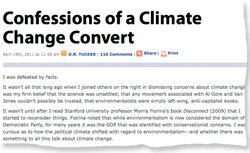Do Climate Skeptics Change Their Minds?
Yes. But not often.
 Until a few months ago, you'd be hard-pressed to find a more classic climate skeptic than D. R. Tucker. A conservative author and radio talk show host, he didn't buy the notion that greenhouse-gas emissions were causing temperatures to rise. He was pretty sure global warming was a hoax perpetrated by Al Gore and a cadre of liberal, grant-hungry scientists. Then Tucker did what partisan pundits and climate skeptics rarely do: He changed his mind.
Until a few months ago, you'd be hard-pressed to find a more classic climate skeptic than D. R. Tucker. A conservative author and radio talk show host, he didn't buy the notion that greenhouse-gas emissions were causing temperatures to rise. He was pretty sure global warming was a hoax perpetrated by Al Gore and a cadre of liberal, grant-hungry scientists. Then Tucker did what partisan pundits and climate skeptics rarely do: He changed his mind."I was defeated by facts," Tucker announced on FrumForum, the popular conservative blog. In an April 18 post, "Confessions of a Climate Convert," Tucker told readers how he came to question the ideologies of the climate debate, examine the science, and conclude that global warming was, in fact, very real. Tucker's post sent a giddy ripple through green circles and stoked the ire of his libertarian colleagues.
Anthony Leiserowitz, director of the Yale Project on Climate Change Communication, attributes this decline to five factors: The economic collapse, a severe decrease in media coverage, weather events like "Snowmaggedon," the efforts of the "denial industry" (the network of industry-funded think tanks and political advocacy groups that push skeptic views), and the "ClimateGate" debacle.This sort of thing doesn't happen often. Or at least, it doesn't seem to. Only 48% of Americans believe that global warming is at least in part "a result of human activities,"according to a 2010 Gallup poll, down from 60% in 2007 and 2008.
This shift toward climate-change skepticism makes Tucker's "conversion" all the more remarkable. So how did it happen?
Leiserowitz has been documenting trends in American climate belief for the past decade. He divides American attitudes toward climate change into six categories: "alarmed," "concerned," "cautious," "disengaged," "doubtful," and "dismissive."
The "alarmed," at one end of the spectrum, are the nation's green activists and Prius-drivers. At the other end are the "doubtful" and "dismissive" climate skeptics. Leiserowitz calls these skeptics "naysayers," and until recently they accounted for a small minority of Americans. When he began studying climate-change attitudes in 2002, naysayers accounted for just 7% of Americans. By last year, that number had risen to 26%. (By comparison, 23% are "cautious," 31% are "concerned," and 14% are "alarmed.")
Tucker was a naysayer. "I bought into Rush Limbaugh's view that the environmentalist movement was 'the new refuge of socialist thinking,' " he tells me. Tucker figured Al Gore and Van Jones (Obama's onetime green jobs adviser) were leading liberals in a plot that used the specter of climate change to snare more power. Leiserowitz would call this "dismissive" thinking.
Tucker's conversion began when he read Morris Fiorina's Disconnect, which outlines the way partisan divisions take shape between Democrats and Republicans, and points out that environmentalism used to be one of conservatives' chief concerns. Tucker's curiosity was piqued.
"Why was it that environmentalism was only associated with the Democratic party now? And it was from those political questions that I became open to the scientific questions," Tucker says. "It went from politics to the science."
After that, a friend convinced Tucker to take a look at the Intergovernmental Panel on Climate Change's Fourth Assessment Report—the authoritative synthesis of the most recent peer-reviewed climate science. "Initially I was a bit skeptical. But I kept on reading it, and there was just so much evidence, and it was so detailed, and it was so backed up, and it was so documented, that I was like, 'holy shit, this is for real.' "
In the months since then, Tucker has become an active proponent for climate legislation: He works with groups like the Citizens Climate Lobby, writes letters to his state representative in defense of the EPA, openly calls for a carbon pricing system, and continues to engage his libertarian friends on the issue.
But Tucker hasn't found much solidarity since his confession. "I have not received any—any—emails or any contacts whatsoever from people who have said they've had a similar journey," he says.
Read the rest of this very interesting article here: http://www.slate.com/id/2293607/pagenum/all/#p2







No comments:
Post a Comment